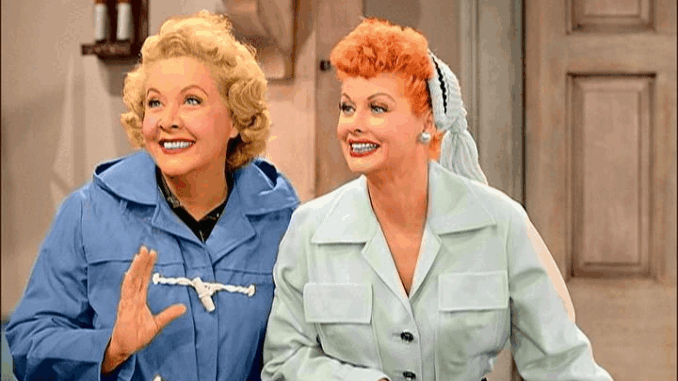
Lucy’s Friend’s “Baby” Is Nothing But Cheese: The Comedy Twist That Shows Why I Love Lucy Still Stands Out
When it comes to timeless television comedy, I Love Lucy holds a unique place. It’s a show that has entertained audiences for decades with its clever writing, unforgettable characters, and perfectly timed humor. Among the many hilarious situations, one of the more peculiar and laugh-inducing moments involves a friend of Lucy’s making a surprising claim—a baby is involved! But the twist? There was no baby at all. Instead, the “precious bundle” everyone thought was an infant turned out to be nothing more than a piece of cheese.
The Classic Setup: Building a Lie for Laughs
One reason I Love Lucy became such an iconic sitcom is the way it built comedy out of misunderstandings and exaggerations. This scene starts like many of Lucy’s best moments—with a simple claim that spirals into something much bigger. A friend of Lucy’s confidently insists that there’s a baby, creating an air of curiosity and drama. It’s the kind of setup that makes audiences lean forward, ready for the inevitable chaos.
The show’s strength has always been in the details. The characters react sincerely, believing every word, which makes the eventual reveal even funnier. The humor doesn’t come from mocking the idea but from playing it straight until the punchline lands.
The Reveal: A Slice of Dairy Comedy
What makes this particular gag so memorable is its sheer silliness. After all the buildup, the tension comes crashing down when the so-called baby turns out to be nothing but a piece of cheese. It’s not just unexpected—it’s absurd in the best possible way. The scene captures the essence of the show’s humor: taking something ordinary, like food, and placing it in an extraordinary, exaggerated situation.
In an era when comedy often relied on sharp dialogue or clever wordplay, I Love Lucy excelled at physical humor and surprise twists. This scene proves that sometimes the funniest punchlines are the simplest ones, made memorable because of how they’re staged and revealed.
Why the Gag Works So Well
At first glance, it might seem like a throwaway joke. But the “baby turned cheese” moment works on several levels. It highlights the theme of exaggeration that runs through I Love Lucy. Lucy’s world is one where little misunderstandings can snowball into major events, where characters often get swept up in their own imaginations.
The gag also shows how much the show relied on timing and performance. Without the earnest delivery of the characters, without the tension of believing there’s a baby involved, the joke wouldn’t land as well. The contrast between expectation and reality is what makes it so funny, and it’s a testament to the writers’ skill that a simple piece of cheese could generate such a memorable laugh.
A Snapshot of Television History
It’s worth remembering the context of I Love Lucy. When this show was airing in the 1950s, television comedy was still finding its voice. Sitcoms were relatively new, and writers were experimenting with humor that could reach a broad audience. The “baby cheese” twist may sound simple today, but in its time it was a clever way to subvert expectations. It reminded viewers that in Lucy’s world, nothing was ever quite what it seemed.
This kind of comedy also gave Lucille Ball and her supporting cast a chance to shine. Ball’s comedic instincts, combined with the reactions of the people around her, made even the smallest gag feel larger than life. Whether it was hiding something from Ricky, creating chaos in a candy factory, or mistaking a wedge of cheese for a baby, the show always knew how to turn the ordinary into the extraordinary.
Why Fans Still Love It
Decades later, fans continue to revisit I Love Lucy because moments like this feel timeless. The humor doesn’t rely on trends or complex references. Instead, it’s based on universal human experiences—misunderstandings, exaggerations, and the little lies we tell for attention or amusement. Lucy’s friend telling a fib about a baby and getting caught is something audiences can still relate to, even if the “baby” is replaced by a slice of cheese.
It’s also a reminder that comedy doesn’t always need to be big or shocking to be effective. Sometimes the funniest moments come from the smallest twists, perfectly timed and delivered with sincerity. That’s why this silly little scene remains worth talking about—it’s an example of how I Love Lucy could take something completely ordinary and make it unforgettable.
